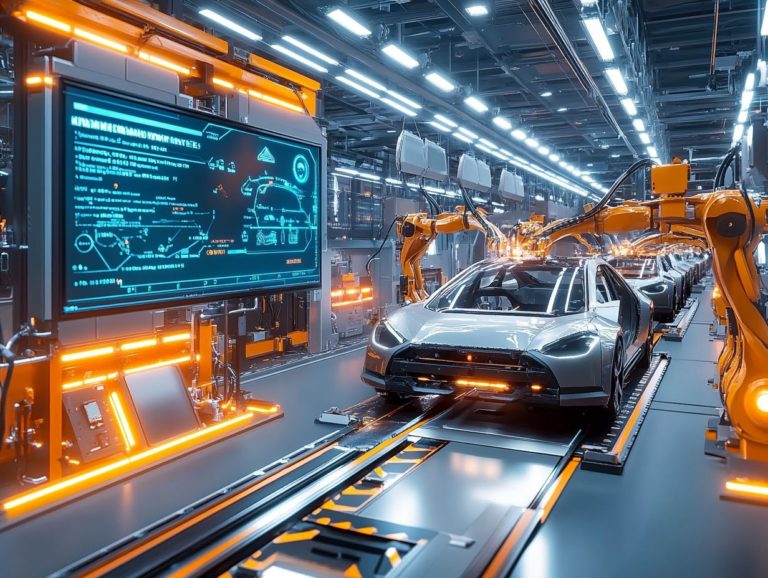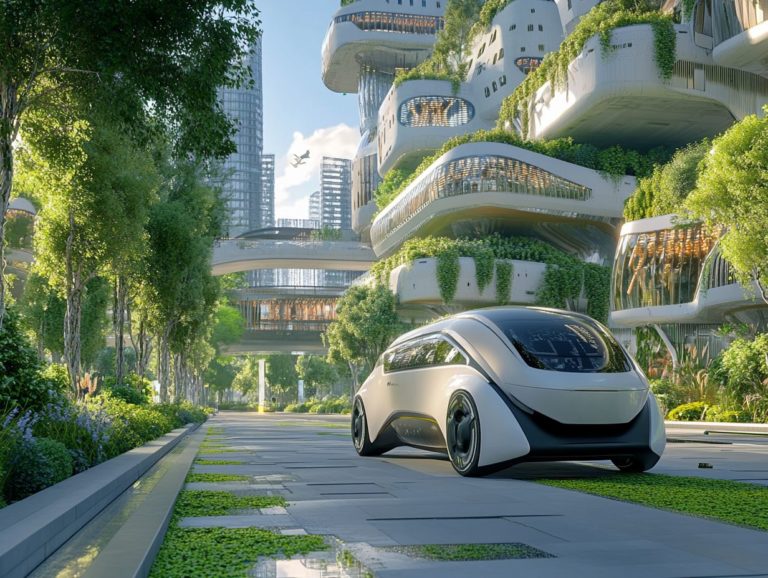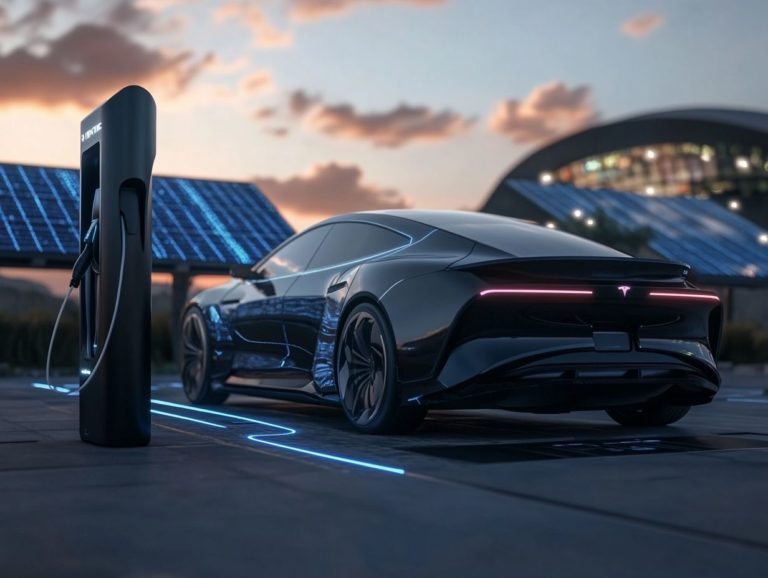5 reasons to support electric vehicle initiatives
As the world embraces sustainable solutions, electric vehicles (EVs) take center stage in this transformative movement. They promise a cleaner, greener future for all.
This article delves into five compelling reasons to champion electric vehicle initiatives. It highlights their role in reducing carbon footprints, lowering air pollution, saving money on fuel, and driving technological advancements.
You will explore the various types of EVs, current challenges, and government incentives. This will provide a comprehensive understanding of why electric vehicles are not merely a trend but a necessity for the future of our planet.
Discover the potential of EVs and what they signify for individuals and society as a whole.
Contents
- Key Takeaways:
- 1. Reduces Carbon Footprint
- 2. Lowers Air Pollution Levels
- 3. Saves Money on Fuel Costs
- 4. Promotes Technological Advancements
- 5. Creates Job Opportunities
- What Are Electric Vehicles and How Do They Work?
- Frequently Asked Questions
- What are the benefits of supporting electric vehicle initiatives?
- How do electric vehicles help reduce emissions?
- What economic benefits can come from supporting electric vehicle initiatives?
- How do electric vehicles contribute to energy independence?
- What technological advancements are associated with electric vehicle initiatives?
- Are there any potential drawbacks to supporting electric vehicle initiatives?
Key Takeaways:
- Switching to electric vehicles can significantly reduce our carbon footprint.
- Supporting electric vehicle initiatives lowers air pollution and improves community health.
- Investing in electric vehicles saves money on fuel costs over time.
1. Reduces Carbon Footprint
Electric cars significantly reduce your carbon footprint from transportation. They produce zero tailpipe emissions and often use renewable energy, helping to lower greenhouse gases.
As the movement towards electric vehicles gathers steam, their significance in environmental sustainability becomes increasingly crucial. These vehicles boast impressive energy efficiency, converting over 60% of the electrical energy from the grid into power at the wheels compared to a mere 20% for conventional gasoline vehicles.
This level of efficiency means that even when considering the electricity generation process, electric cars still stand out as a greener alternative, particularly in areas that harness solar, wind, and hydroelectric power.
Switching to electric cars helps create cleaner air, reduces health-related costs associated with pollution, and decreases greenhouse gas emissions from the transportation sector.
These benefits enhance individual well-being and align perfectly with global efforts to mitigate climate change.
2. Lowers Air Pollution Levels
Electric vehicles, whether battery electric or powered by hydrogen instead of traditional fuels, are essential in the quest to reduce air pollution. They produce zero harmful emissions that contribute to smog and respiratory diseases.
By eliminating tailpipe emissions, you ll see a significant reduction in pollutants like nitrogen oxides and particulate matter common in traditional gasoline vehicles. Studies indicate that cities with higher rates of electric vehicle adoption have experienced up to a 45% decrease in harmful particles, resulting in clearer skies and healthier communities.
Clean Air Vehicle programs play a pivotal role in this transition, offering incentives that encourage you to opt for electric options. These initiatives elevate urban air quality and lead to a notable decline in asthma and other health-related issues, illustrating the profound impact that EVs can have on your community’s well-being.
3. Saves Money on Fuel Costs
Switching to electric vehicles can lead to substantial savings on fuel costs, as they tend to be more energy-efficient than traditional gasoline vehicles. This efficiency allows you to enjoy lower expenses associated with charging stations and overall fuel economy.
This transition can dramatically reduce your monthly expenses, especially when considering the fluctuating prices of gasoline. When evaluating long-term ownership costs, electric vehicles typically require less maintenance, further enhancing your savings over time.
State and federal tax incentives also play a vital role in offsetting initial purchase prices. This makes electric vehicle ownership even more enticing. These savings can accumulate significantly, transforming your financial landscape when you switch from gas to electric.
4. Promotes Technological Advancements

The rise of electric vehicles is driving technological advancements across various sectors. This trend brings new innovations in battery technologies, supply chains, and performance enhancements that elevate your driving experience and increase access to electric mobility.
This surge in demand compels both established manufacturers and ambitious startups to invest heavily in research and development. Collaborations between electric vehicle manufacturers and tech firms are becoming the norm, creating a dynamic synergy that leads to groundbreaking advancements.
These partnerships focus on boosting battery capacity and efficiency. The aim is to extend driving ranges while reducing charging times. Consequently, new materials and smart technologies are being explored, ensuring that the future of electric mobility caters to your needs and promotes a sustainable environment.
5. Creates Job Opportunities
The expanding electric vehicle market opens up a variety of exciting job opportunities across several industries. These range from manufacturing and maintenance to the vital development of EV infrastructure, including charging stations and training programs for technicians.
This demand creates diverse roles for you to explore, such as assembly line workers, battery specialists, and fleet maintenance technicians.
As infrastructure evolves, the need for skilled professionals to install and maintain charging stations becomes increasingly critical. This ensures a seamless transition to electric vehicles for consumers.
Programs like the Electric Vehicle Infrastructure Training Program play a key role in this landscape. They equip you with the necessary skills to thrive in this rapidly growing field.
By focusing on hands-on learning and contemporary technologies, these training initiatives prepare you for emerging challenges as the sector continues to expand.
What Are Electric Vehicles and How Do They Work?
Electric vehicles (EVs) are changing the way we drive. They utilize electric motors powered by rechargeable batteries. You ll find various options available, including battery electric vehicles (BEVs) and plug-in hybrids. Each operates differently but shares a common goal: to provide eco-friendly alternatives to traditional gasoline engines.
While conventional internal combustion engines convert fuel into motion through combustion, electric motors harness electromagnetic forces to generate power. This results in smoother acceleration and a quieter ride an experience that truly redefines driving.
For those who prioritize battery power, battery electric vehicles (BEVs) often offer the longest driving ranges per charge. If you’re looking for versatility, plug-in hybrid vehicles (PHEVs) combine the best of both worlds, allowing you to switch between electric and internal combustion power for longer journeys.
Then there are hydrogen fuel cell vehicles, which take a unique approach by converting hydrogen into electricity. This reduces reliance on traditional charging methods. Each type of electric vehicle comes with distinct features, such as varying battery life and diverse charging options, from convenient home charging stations to fast-charging networks. All contribute to a greener, more sustainable future.
What Are the Different Types of Electric Vehicles?
There are several types of electric vehicles you might consider, including battery electric vehicles, plug-in hybrid electric vehicles, and hydrogen fuel cell cars. Each option offers unique advantages tailored to your specific needs and preferences.
Understanding the distinctions among these vehicle types is crucial if you’re contemplating a shift to greener transportation.
Battery electric vehicles operate solely on electricity, often boasting higher efficiency ratings and longer ranges. This makes them perfect for your daily commutes and short trips.
Plug-in hybrid electric vehicles blend traditional combustion engines with electric propulsion, providing you with the flexibility for longer journeys while still maintaining some electric range.
Hydrogen fuel cell vehicles use distinct technology to convert hydrogen into electricity. They contribute to a minimal environmental impact but face challenges related to refueling infrastructure and energy efficiency.
Each option presents a unique set of benefits, from reduced emissions to cost-effectiveness, while also facing drawbacks such as range anxiety or the availability of charging stations.
What Are the Current Challenges for Electric Vehicles?
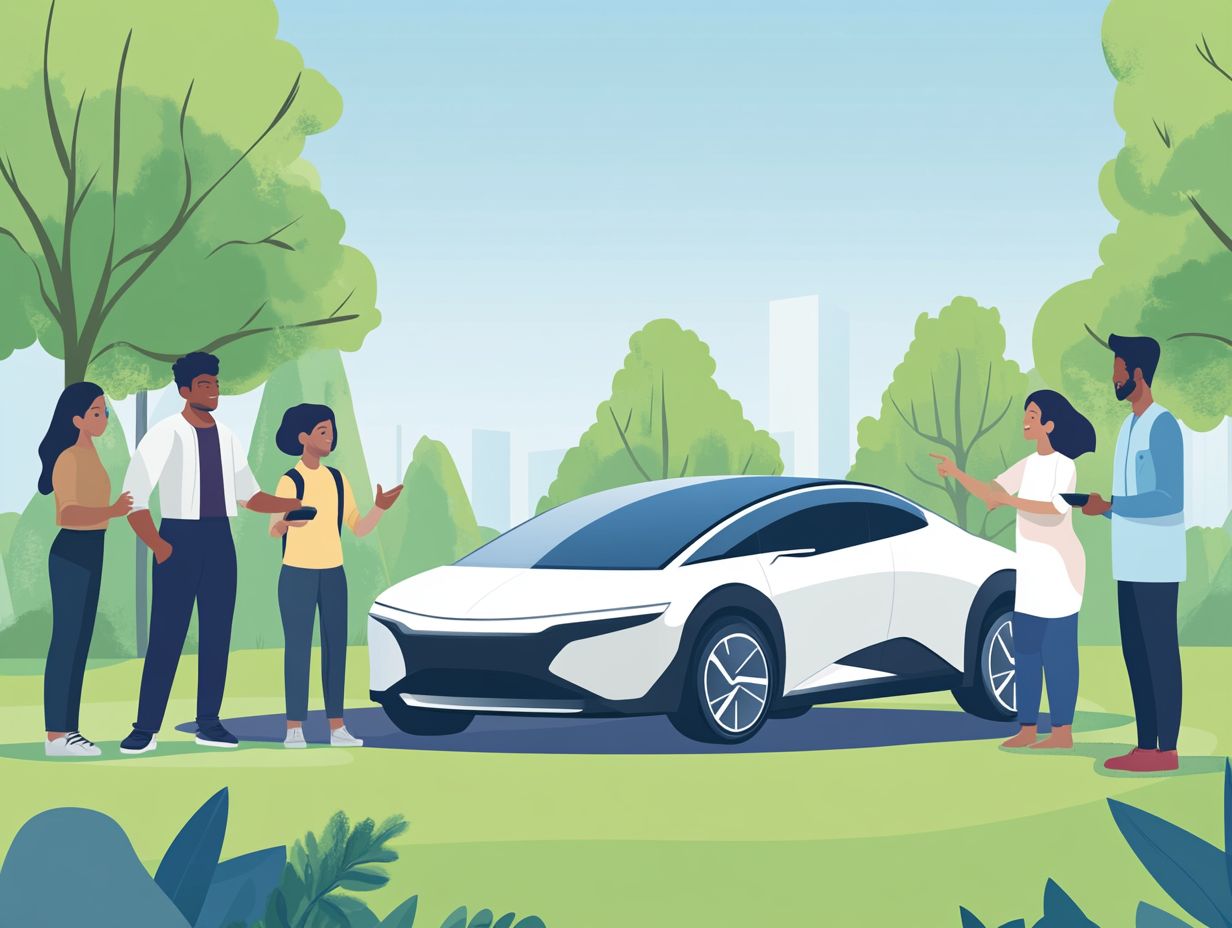
Despite the many benefits of electric vehicles, you ll encounter several hurdles along the way. These include the urgent need for improved EV infrastructure, a scarcity of charging stations, concerns over battery life, and maintenance demands that differ from traditional cars.
These challenges can be daunting but are not insurmountable, as many potential buyers often feel uneasy about the reliability and convenience of charging options. The current lack of sufficient charging points limits long-distance travel, making the transition to electric vehicles feel less appealing.
Ongoing advancements in battery technology hold great promise, yet they haven’t yet reached an affordability or efficiency level that fully alleviates concerns about range anxiety.
As these challenges continue to linger, they raise valid questions about long-term market growth and whether the automotive sector can transition smoothly toward a more sustainable future.
How Do Electric Vehicles Compare to Traditional Gasoline Vehicles?
When you compare electric vehicles to traditional gasoline ones, it becomes evident that EVs often come out on top in fuel economy, lower maintenance costs, and significant emissions reduction. This makes them a compelling choice for those who care about the environment.
You re likely among the growing number of consumers who recognize the long-term benefits of electric mobility. EVs can cut your fuel costs by up to 80% compared to gasoline vehicles, and routine maintenance is far less frequent thanks to the absence of complex engine components.
Research suggests that making the switch to electric vehicles could reduce greenhouse gas emissions by as much as 70%, contributing to global sustainability efforts. The total cost of ownership may also decrease significantly, with some estimates showing potential savings of over $5,000 throughout the lifespan of the vehicle.
This blend of economic and environmental advantages positions EVs as a smart, forward-thinking option for your modern transportation needs.
What Are the Government Incentives for Electric Vehicle Adoption?
Government incentives are essential in promoting electric vehicle adoption, offering a range of tax credits, federal and state benefits, and initiatives like the Clean Vehicle Rebate Project to make EVs more attainable for you.
These incentives often come with substantial federal tax credits that can significantly lower the upfront cost of purchasing an electric vehicle. State-level programs also provide rebates, grants, or extra tax breaks.
As a result, you might find yourself more inclined to consider electric options, knowing you can offset some of the costs with these financial perks. This supportive framework shapes your purchasing decisions and contributes to the broader growth of the electric vehicle market, encouraging you to shift from traditional combustion engines to cleaner alternatives.
Explore available incentives to make your electric vehicle purchase more affordable today.
Conclusion: Electric vehicles represent a vital step toward a sustainable future. By understanding their benefits, challenges, and available incentives, you can make an informed choice that aligns with both your values and budget.
What Are the Predictions for the Future of Electric Vehicles?
Predictions for electric vehicles show remarkable growth in the market. This growth is driven by new technologies and more options for drivers.
Innovations like solid-state batteries will redefine your driving experience. These batteries promise longer life and quicker charging, making EVs even more attractive.
The growth of charging stations and improvements to our power grid are also vital. Analysts expect the market to expand significantly, highlighting the role of electric utilities in this transition.
Frequently Asked Questions
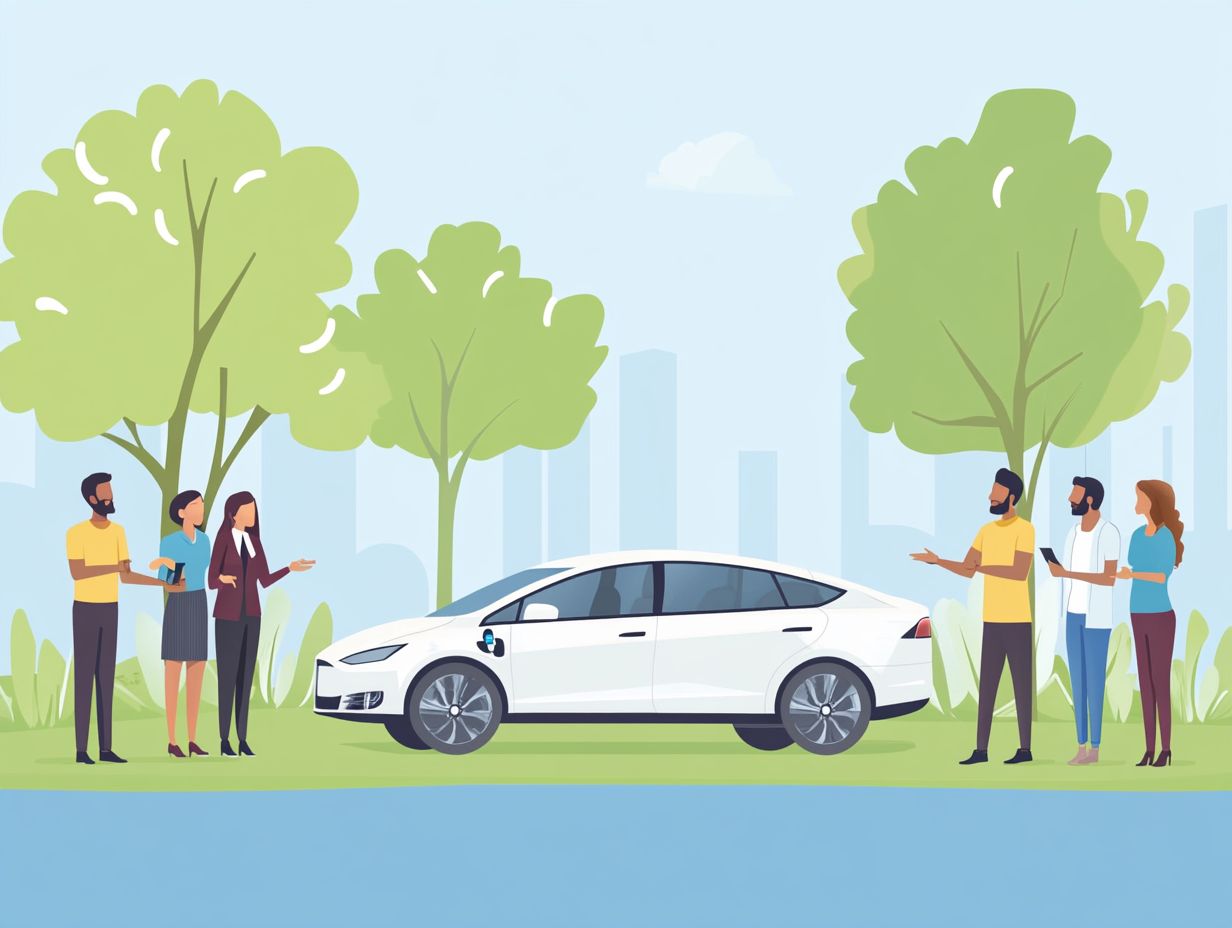
What are the benefits of supporting electric vehicle initiatives?
Supporting electric vehicle initiatives can reduce emissions and improve air quality. Additionally, it offers economic benefits and fosters technological advancements.
How do electric vehicles help reduce emissions?
Electric vehicles produce far fewer greenhouse gases than gasoline cars. This helps fight climate change and improves air quality.
What economic benefits can come from supporting electric vehicle initiatives?
These initiatives can create jobs and stimulate growth. They can also save money on fuel and maintenance.
How do electric vehicles contribute to energy independence?
Electric vehicles reduce our reliance on foreign oil. They use electricity produced right here at home.
What technological advancements are associated with electric vehicle initiatives?
The rise of electric vehicles has led to breakthroughs in battery technology and charging systems. These advancements benefit many industries and society overall.
Are there any potential drawbacks to supporting electric vehicle initiatives?
While the benefits are significant, some challenges remain. The initial cost of electric vehicles and the need for more charging infrastructure are important considerations.


